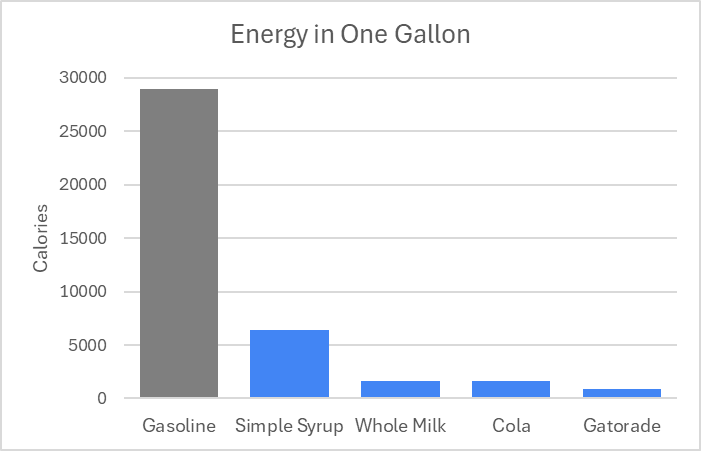Marathon vs. Car: Who's More Energy Efficient?
Written on
The Marathon Challenge: Runners vs. Vehicles
Picture this: a marathon race between a dedicated long-distance runner and a sleek sedan, like a Toyota Camry. The car is fueled with a gallon (3.78 L) of gasoline while the runner receives an equivalent amount of food energy.
When the starting signal sounds, the car speeds off, leaving the runner behind. However, after 25 miles, with just a short distance left to cover, the car begins to falter and eventually runs out of fuel. Meanwhile, three hours later, the runner has enough reserves to pass the car and finish the race triumphantly, taking home the medal as confetti rains down. It's a classic tale of the tortoise and the hare.
Incredible as it sounds, if the runner were an ultra-marathon enthusiast, he could use the remaining energy from his food to run the marathon again—up to nine additional times (with some necessary breaks in between).

The Energy Efficiency Equation
Both gasoline and food serve as energy sources, but they are measured in different units: gallons for vehicles and kilocalories (often just called calories) for food. A gallon of gasoline holds approximately 121 megajoules (MJ) of energy. The average vehicle achieves around 25.7 miles per gallon (MPG), closely aligning with the 2024 Toyota Camry XSE, which is just shy of the distance of a marathon (26.2 miles).
To put this in perspective, one MJ equals about 239 kilocalories, meaning a single gallon of gas contains nearly 29,000 calories.

As an average runner logging over 100 fitness sessions, I've observed that I typically burn around 103 active calories per mile.

Converting these figures, a long-distance runner can cover an impressive 281 miles (452 km) using the same energy found in just one gallon of gas—this is an astounding 10 times the distance a car can travel! Thus, a human can complete multiple marathons on the equivalent energy of a single race for a vehicle.
The Electric Vehicle Perspective
Electricity, another energy form, is often measured in kilowatt-hours (kWh). In the context of U.S. fuel economy standards, the efficiency of electric vehicles (EVs) is typically expressed as miles per gallon equivalent (MPGe), with 33.7 kWh equating to one gallon of gasoline. The leading EV, Tesla's Model Y, boasts a remarkable 105 MPGe or approximately 3.1 miles per kWh.
While the Tesla displays significantly better efficiency than the Camry, it still cannot compete with a long-distance runner's energy usage.

Should We Ditch Cars for Running?
Absolutely not! As a frequent runner, I can attest that it can be quite tiring. Cars provide numerous benefits beyond mere efficiency; they are much faster and can carry heavy loads. Personally, I prefer not to juggle a water bottle during a run, let alone transport multiple passengers or luggage.
This comparison, while entertaining and thought-provoking, does have its limitations. We can't simply convert gasoline into something consumable, even if corn can be transformed into gasohol. Furthermore, there are various valid methods to measure efficiency, including cost per mile and emissions per mile, which also consider the weight of the runner versus that of the vehicle.
This analysis serves to offer a light-hearted perspective on our energy consumption. If you've driven for a mere half-hour today, chances are your vehicle consumed more energy than you will intake over the next fortnight. For those who live nearby a grocery store and require just a few items, walking could be a healthier and more sustainable option.
It's easy to overlook the sheer energy required for driving, even with efficient cars. The average American consumes about 70 lbs (32 kg) of gasoline weekly, a process that is often invisible as we fill our tanks and the engine operates. Modern car designs have made fuel consumption feel abstract.
Ultimately, fossil fuels and the energy that powers our electricity are limited resources with significant consequences if overexploited. We must ensure we utilize this fuel to its fullest potential.
This video titled "Fuel Efficient Cars - Shell Eco-marathon" explores the efficiency of vehicles designed for optimal fuel usage, showcasing advancements in automotive technology. It further emphasizes the importance of sustainability in transportation.